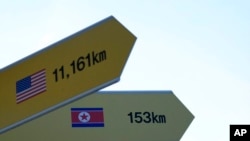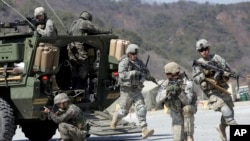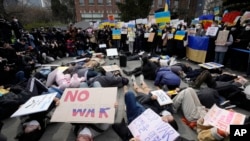Experts say the Russian invasion of Ukraine is likely to spur North Korea to take a bolder stance in pursuing its long-term goal of fracturing South Korea’s alliance with the United States.
Retired U.S. Army General James Thurman, commander of U.S. Forces Korea (USFK) from 2011 to 2013, said, North Korean leader “Kim Jong Un will seize on the Ukraine-Russia crisis to test the alliance” of the U.S. and South Korea.
As Russia’s invasion of Ukraine raged into its sixth day on Wednesday, Ukrainians continue to fight alone to defend the capital of Kyiv, without the support of a military force from neighboring European countries or the U.S.
President Joe Biden reiterated his promise not to send U.S. troops to defend Ukraine on February 24, the day when Russian President Vladimir Putin authorized “a special military operation,” essentially declaring war on Ukraine.
Ukraine is not a member of NATO, the U.S.-led security alliance of European and North American countries, and it does not have a bilateral security treaty with the U.S. that guarantees U.S. defense against an attack on its territory.
Testing the alliance
The U.S. is, however, bound by a Mutual Defense Treaty that obliges it to help defend South Korea against an external aggression.
Despite the treaty, experts are concerned that Russia’s invasion of Ukraine and Biden’s decision not to send American forces to defend Ukraine could motivate Pyongyang to reinvigorate its efforts to weaken the alliance between the U.S. and South Korea.
North Korea has long sought to break Seoul’s alliance with Washington. It views the U.S. military presence in South Korea, joint military exercises, and a security guarantee bolstered by U.S. nuclear force defense as “hostile policy.”
“We should expect the North to try to continue to break the alliance,” David Maxwell, a senior fellow at the Foundation for Defense of Democracies, said.
“It may assess an opportunity and will surely use political warfare and influence operations to try to subvert the ROK government and the Koreans in the South to make them question the alliance and the U.S. commitment,” he added.
South Korea’s official name is the Republic of Korea (ROK).
Other experts contacted by VOA were less concerned about the U.S.-South Korean alliance.
Michael O’Hanlon, director of research in foreign policy at the Brookings Institution in Washington, said, “With 30,000 U.S. troops in ROK, I doubt” North Korea would draw rash conclusions about taking aggressive steps toward South Korea.
And Evans Revere, a former State Department official with extensive experience negotiating with North Korea, said, “U.S. determination to defend its allies is stronger today than it has ever been precisely because of the Russian invasion of Ukraine.”
VOA’s Korean Service contacted North Korea’s U.N. mission for a comment on Biden’s decision not to send American troops to Ukraine but did not receive a reply.
Pro-alliance sentiment in Seoul deepened as the Ukraine crisis unfolded.
A spokesperson for South Korean presidential contender Yoon Suk-yeol of the opposition People Power Party told VOA’s Korean Service on Tuesday, “The Ukrainian situation reaffirms the importance of alliances.”
The spokesperson continued, “A Yoon Suk-yeol government will strengthen and advance the ROK-U.S. alliance into a comprehensive strategic alliance based on close communication and cooperation between the two countries.”
VOA’s Korean Service contacted the office of South Korea’s ruling Democratic Party presidential candidate Lee Jae-myung but did not receive a reply.
Pro-alliance sentiment
Cha Dong-gil, professor of the Marine Corps Military Studies at Dankook University in South Korea, told VOA’s Korean Service on Monday that “South Korea needs to rely on its alliance with the U.S.” while building its own military strength.
“While the U.S. attention is focused on (Ukraine), Kim Jong Un could seize an opportunity,” he added, and “raise provocations to test the U.S. resolve” to respond to its threats.
Moon Hyung-woong is a 25-year-old job seeker whose girlfriend is in Ukraine. “South Korea needs to maintain good relations with the U.S.,” he said. “The withdrawal of U.S. forces from South Korea will pose threat to South Korea’s national security.”
North Korea conducted its eighth missile test of the year on Sunday, calling the launch a test for developing “a reconnaissance satellite.”
Hyungjin Kim in Seoul contributed to this report.
















